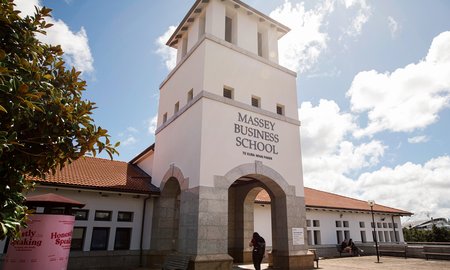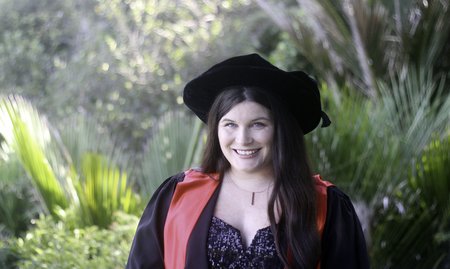
The research project seeks to drive improvements in organisational excellence and performance that will ultimately benefit the New Zealand economy.
In today’s fast-paced business landscape, the culture within an organisation isn’t merely a backdrop - it’s the lifeblood that drives employee engagement, resilience and long-term value. As companies navigate challenges and opportunities, understanding how to harness organisational culture becomes essential for competitive advantage.
Understanding how to optimise organisational culture is the subject of a first-of-its-kind research initiative that aims to bring useful data and insights to Chief Executive Officers (CEOs) and leaders across the country, to drive improvements in organisational excellence and performance.
The research is led by Te Kunenga ki Pūrehuroa Massey University PhD candidate Susanna Lee, who is a former senior leader, equity portfolio manager and Director at Harbour Asset Management, where she demonstrated that investing in companies with strong leadership and governance enhances firm value. Ms Lee is also the Executive Director of the Leadership and Governance Collective, which comprises academics, executives, directors and organisations focused on delivering practical insights for organisations and fostering continuous improvement.
The research is guided by Associate Professor Claire Matthews and Dr Jeffrey Stangl, senior staff members at Massey University’s Business School. Their industry profiles and external governance roles ensure that the research maintains rigorous academic standards and relevance to practice.
Ms Lee undertook more than 70 informal conversations with CEOs, board members and senior leaders to ensure the research content directly addresses the priorities and needs of leaders.
From these conversations, it became apparent that the research needed to focus on CEOs or leaders of organisations because their visions, decisions, behaviour and expectations directly shape organisational culture, which implements strategy.
The resulting survey focuses on organisational culture which is difficult to measure but a driver of organisational success or failure. It covers key elements such as risk-taking, long-term orientation, ethics, and the impacts of artificial intelligence (AI) and hybrid working.

Susanna Lee.
“We know survey fatigue is real, and with the busy schedules of CEOs and leaders, it’s hard to get their engagement. However, this annual survey is designed specifically to benefit organisations, with the promise that they will gain access to the data and insights via customised dashboards,” Ms Lee says.
With sufficient participation, the dashboards will be segmented by organisation type, size and sector, allowing organisations to benchmark themselves and providing transparency and insights into best practices, she adds.
“Just 15 minutes of a CEO’s time each year can deliver substantial benefits to their organisation, as well as positively impact New Zealand’s economic and social infrastructure.
“The beauty of this research is that it is academically and commercially independent, and it benefits from a high-level Advisory Board of executives and governance professionals to ensure that the research and its outputs are communicated effectively, enabling senior leaders and boards of directors to leverage the findings to enhance their organisations.”
The Advisory Board includes:
- Brooke Roberts, founder and Co-CEO of Sharesies, who brings extensive leadership experience in startups, scale-ups and B Corps, as well as governance expertise in both for-profit and charitable organisations.
- Tahana Tippet-Tapsell, General Manager at Tūaropaki Trust and with multiple governance roles, provides valuable insights into Māori businesses, championing long-term prosperity for Māori communities and iwi.
- James Lee, former CEO of Jarden, who currently provides strategic advice to boards focusing on long-term strategy, aligning stakeholder interests and developing cohesive cultures, and is recognised as a highly regarded, award-winning CEO.
- Rhiannon McKinnon, founder of CEO 101, CEO at Cassiobury and former CEO of Kiwi Wealth, and was named CEO of the Year at the 2022 Asia-Pacific SABRE Awards.
- Kalyn Ponti, CEO of Humankind, who played a key role in introducing the Best Place to Work Awards to New Zealand, and is dedicated to demonstrating that thriving people and commercial success go hand in hand.
- Sophia van Zijl, a leader with strong expertise in financial management and strategic people leadership focuses on leveraging employee engagement to drive commercial success and long-term value.
- Michael McCarthy, holds multiple governance roles and has a background in leadership, including as former CEO of Farmers Collective and former CFO of Wellington Hospital. He brings extensive experience from both the primary and private sectors.
The main points the first survey will cover are:
- Organisational culture and firm value – exploring whether CEOs believe organisational culture enhances the value of the firm and why it is important.
In the pre-research conversations, many New Zealand leaders stated they would not make an offer on a culturally misaligned company. One questioned why anyone would, unless they were not planning to acquire the people. Leaders agreed that organisational culture impacts firm value and some provided examples. One CEO said that during the COVID-19 pandemic their employees went above and beyond their job descriptions to support their customers, while competitors flailed.
- Organisational culture, risk-taking and long-term orientation - examining the signals sent by incentive structures for both CEOs and staff.
Industry leaders revealed distinct attitudes towards risk among different organisations. For-profit companies, driven by investor or owner expectations, exhibited a higher propensity for risk-taking, contrasting with the stewardship approach of government entities. New Zealand governance leaders emphasised that selecting a CEO with aligned risk preferences is important for an organisation’s growth prospects and cultural alignment. CEOs add that, although they are not personally driven by monetary incentives, the structure of their pay still signals the board and investor priorities for risk-taking and their approach to the long term.
- Organisational culture and ethics – assessing whether the culture is prescriptive, principle-based or a combination of both.
Numerous leaders emphasised that ethical leadership is crucial for developing an ethical culture, emphasising that the CEO must advocate for and embody the company’s ethical standards, thereby shaping the overall culture. Many noted that if leaders are corrupt or ineffective, this can permeate though the entire organisation.
- Organisational culture – identifying where companies are investing their efforts, how they measure success and the barriers to cultural investment.
One CEO described a sophisticated approach using a dashboard to measure various aspects of culture, including customer loyalty, staff engagement, financial results, productivity, quality metrics and safety. Most leaders admit that they measure aspects but should do a more comprehensive job. Many measure staff engagement, and while most track turnover, they admit it is a lagging indicator.
- Contemporary issues – the impact of in-office, hybrid and remote working on organisational culture, and the adoption of AI.
Many CEOs viewed flexible working as the new normal and many leaders noted that remote work makes maintaining culture challenging, particularly for new employees. Most said they adopt a hybrid approach to accommodate diverse preferences while preserving culture.
Many New Zealand leaders recognise AI as crucial for enhancing productivity and efficiency, though opinions on its deployment and impact on the workforce vary. One executive noted that the public sector’s cautious approach, mindful of job displacement concerns, contrasts with the private sector’s view of AI as a key driver of innovation.
Ms Lee says the survey aims to capture leaders of listed companies, B Corps, Māori businesses, private companies of varying sizes including startups, private equity firms, venture capital firms, registered charities and local and central government.
Official partners include the New Zealand Institute of Economic Research, BusinessNZ, Local Government New Zealand (LGNZ), Creative HQ, New Zealand Growth Capital Partners, and Ākina. Additionally, numerous industry groups and supporters will deliver the survey to their networks. Supporters will continue to be added until the release date on 22 October to maximise participation and the depth of information returned to leaders.
Related news
Massey Business School shines in latest Shanghai Rankings
Te Kunenga ki Pūrehuroa Massey University’s communication, agriculture and economics programmes have risen in the most recently published Shanghai Rankings.

Need some free brains? Massey Business School can help with that!
A new partnership between Massey Business School and the Auckland Business Chamber is linking the brains of Master of Business Administration students with the needs of businesses in Tāmaki Makaurau.

Bringing multiple job holding out of the moonlight
Dr Zoë Port is a Lecturer in the School of Management at the Massey Business School, and also Co-Director of the Healthy Work Group research team.
